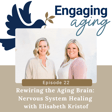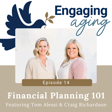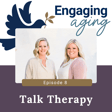Become a Creator today!Start creating today - Share your story with the world!
Start for free
00:00:00
00:00:01

Addressing Family Dynamics
Life is messy! We all bring our previous experiences and relationships into our current situation. “Perception is reality” and our perceptions vary greatly from one another. Join us as we share the reality of family dynamics through real-life examples and offer simple solutions for families facing similar challenging dynamics.
Transcript
Introduction to Engaging Aging
00:00:02
Speaker
Welcome to Engaging Aging with Erin and Lauren. Join us as we share laughter, tears, and demystify the realities and silver linings that occur later in life.
Impact of COVID on Family Relationships
00:00:16
Speaker
Welcome back. It's Erin and Lauren here in the studio today.
00:00:21
Speaker
I think we need to take a deep breath. Yes, heavy, heavy, heavy stuff. You know, you and I have talked about a lot that we are coming off of a time, we're still not even there yet, but COVID and really heavy emotions and how that plays, I think, for a lot of people in their family dynamics. Family
Family Crises and Dynamics
00:00:41
Speaker
dynamics are real, and I think that we need to talk about that.
00:00:45
Speaker
How can we recognize it but also how can we help each other through it sometimes yes i think that the type of work that we do stepping into oftentimes crisis situations with families.
00:01:00
Speaker
It's a lot. It's very heavy energetically, but it's okay. So we are not widgets on a factory assembly line. We're humans. We have life experiences. We have personalities. We have an energetic being to us.
00:01:21
Speaker
And so that can be a lot to step into as professionals when we step into that space with someone. It's a lot to get a good understanding of who they are, where they're coming from, what's important to them. But for us individually as humans, if we're the ones in the situation as the adult child,
00:01:40
Speaker
how to be present in our full version of ourself without bringing all of that into the space. What I mean by that is there can just be a lot that gets thrown on the table that's maybe not relevant to the situation at hand. Yeah.
Perception and Memory in Sibling Relationships
00:01:58
Speaker
So let's make it about what it's about, not all the other stuff. So I haven't used this story in a while, but
00:02:08
Speaker
I think I read it maybe 10 years ago, but there was this story written an older adult had passed away and I think she had like four or five different children that flew into town for her services.
00:02:22
Speaker
And they were all at the home going through her personal belongings, and they started talking about how mom used to take a sip of all of their cups of milk at dinner every night. And each child had a totally different perception and memory and idea of why did mom do that. So one child thought it was very endearing. Like, look at how sweet mom was. She was testing it. Mom's tasting the milk before it.
00:02:47
Speaker
That's my stomach. Yeah, it's not spoiled. Another child was like so rude of her to be drinking my milk, like that's my milk. And so everyone agreed. They all had a different, you know,
00:03:00
Speaker
perspective on why mom drank the milk. They all agreed that, you know, they remembered the same memory that mom took a sip out of our milk every night. But their perception of why varied greatly depending on their individual relationship, not only with their mother probably, but with one another.
Sibling Rivalry During Life Transitions
00:03:18
Speaker
So I think we had this situation today, we're actually coming into this podcast today from a heavy family dynamic situation where two siblings are arguing over what should happen with the belongings in the home, but I don't think it really has to do with the belongings in the home and what should happen. It's long stemming. Deep rooted. Deep rooted stuff that's been going on. Yep, sibling rivalry stuff.
00:03:44
Speaker
that is raring its ugly head now because it was never addressed or dealt with. And so what I'd love to talk about today further with Family Dynamics, please start to use this life transition opportunity to have these conversations so they don't keep showing up for you in your life.
00:04:05
Speaker
Really
Mediation in Family Disputes
00:04:05
Speaker
getting off your chest what you need to say to yourself to your loved one Maybe it's writing a letter to that person and never even giving it to them, but getting it out So it's not going to show up down the end. I also think that it's okay In a lot of situations to just take a minute take a deep breath and ask yourself
00:04:26
Speaker
Can we deal with this on our own? Can we get to a place where we are agreeing on what needs to happen? Or do we need a professional to step in just as a mediator to help us look at the situation at hand from each other's standpoint? And sometimes when we do that, we realize that what we're assuming the other person is feeling
00:04:50
Speaker
isn't even what that person is feeling, right? Assumptions can get people in a lot of trouble, and that's what's happening in this situation. Let's talk about the role of a mediator. I actually just brought that up with these clients today. The role of a mediator to mitigate a situation, to keep it from getting to that point of a boiling point, is so important. One, we all need to be heard.
00:05:15
Speaker
That mediator is going to listen to you in here, but then to your point, find a common ground because it's usually closer than you think it is. Yeah. And we all have our own emotions too. Like it's well beyond what's happening in that situation. What's happening with those belongings in that home, that timing, who's getting what, who is really leading the charge, right?
00:05:39
Speaker
Who's making that ultimate decision probably goes back down to that sibling dynamics, that sibling rivalry or whatever is there. But furthermore to that, it could be what's happening in that person's individual life. Is there something deeper that's going on with them right now that
00:05:58
Speaker
What's happening with mom's belongings doesn't have anything to do with that. Yeah. And I think, you know, there's there's other things too, like undiagnosed mental health. We see a lot in our clients or maybe diagnosed mental health that's not known. There are bigger pieces at play.
00:06:15
Speaker
And it's not up to us to fix anyone else in our life, right? So really focusing in on, if you can't understand where they're coming from, getting clear on your lens. How are you showing up to this conversation and situation? And is it really what's best? And then for the older adult, when we talk about family dynamics, we see this a lot. And we talked in another episode about role reversal, when things start to change from parent to child.
00:06:46
Speaker
If your father has always been the leader of the household, he has always been the decision maker, you never questioned what he said or did, and now that's starting to change, talk about adding some dynamics to the situation. How do we not allow it to get to that point, help him remain in control of his decision making so that maybe we can avoid some of these hot button issues through this situation today with these two adult sons.
00:07:15
Speaker
kind of battling it out, when asked what does mom want, it cut right through the center of it all and was answered really clearly and I think they both agreed with what she wants. So how do we focus on that and sometimes take our own personal stuff off the table, which isn't easy to do.
00:07:33
Speaker
And like we were saying before, sometimes we can't even do that together. We need that person to really hear both sides and help us through that, which I think is an important time to kind of just turn this conversation a little bit, right? Because we're professionals. We take that on. We try and help people all of the time navigate these family dynamics. Sometimes we can get ourselves into a position to where
00:07:57
Speaker
maybe we're crossing the line of where we need to help them. If you're good with it, I'd love to talk about from a professional standpoint, like when we start to see family dynamics, because we have a lot of professionals that we work with that are listening to this episode right now, when can they start to see the red flags of family dynamics? And instead of really inserting themselves, take a step back and know when it's
00:08:24
Speaker
much bigger than what they can help them do. And staying in their lane as well, but bringing in some different professionals to help them. Yeah, I mean, I think it's always about active, true, engaged, active listening.
Identifying Red Flags in Family Dynamics
00:08:40
Speaker
So the things that you hear come up, that could be a red flag, is when it's not about the person at large. So if we're talking about mom and mom situation,
00:08:51
Speaker
and the conversation is going on about the sister, one sister talking about the other sister. Red flag, family dynamics, why is she the topic of conversation when it should be about mom? When we hear, he did this, he said that, another red flag, it's not about what he or did, it should be about the person, the situation that we're in, the bigger picture, the older adult in this scenario.
00:09:17
Speaker
When you hear the change in tone, it's like a switch sometimes you can tell. Meaning when you asked that question of what would mom want, you heard a huge shift in the tone that was being presented during that conversation. Yeah, it toned it down. They both kind of took in separate conversations because it was an individual conversation with each. Both kind of went
00:09:43
Speaker
Well, what she really wants is. And so it wasn't heightened emotion against each other. It was refocusing and redirecting their breath and their energy back to what the whole point of this is.
Grace and Understanding in Families
00:09:56
Speaker
What does mom want? But I don't want to, I think we say this about crisis, and I'm going to say it about family dynamics.
00:10:03
Speaker
I don't want to glaze over it. It can be a true gift to a family when all of this muck is brought to a head so that they can actually deal with it. So that if you work through it, you have a family mediator or a family therapist to help them work through those long-term issues that they've always had, maybe you can get ahead of it so that at a point of a funeral, there aren't the fights or the arguments.
00:10:28
Speaker
Maybe this is coming to a head now so that you can find closure and move forward with peace versus being dragged through the mud. I think sometimes too, some of us don't have the strength to bring that up, right? And so to your point, those family dynamics come up at a time when it has to, like we all have to do the work and dig really deep and kind of get through that so that
00:10:51
Speaker
for that short amount of time that we have with our loved ones in their third third, as you put it, focusing in on that person and what we want so that we don't have regret when it is final. And we didn't deal with that and we didn't work through it. Yeah, and I don't know if I said this already, but I know we say it a lot, like just giving everyone grace. I genuinely believe the majority of humans wake up every day
00:11:20
Speaker
trying to be the best version of themselves. No one I know wakes up and says, I am really going to try and mess up someone's life today. And you don't know what everyone's carrying in their load on their back. So they get up, they do the best they can and give them grace for that because I know I'm not always going to be perfect. And if I'm having a bad day, I need someone to give that back to me. So take a breath, take a minute, give one another grace and
00:11:47
Speaker
Get the help. Don't wait until you're in a crisis when things are going to, emotions will be heightened. You know, take a minute, recenter yourself and find clarity. Yeah. So as we kind of wrap this up, um, I think that there's a lot to kind of think about. I think one, it's, you know, we don't have to go at it alone. Sometimes we do need to ask for help. Um, two, there can be blessings.
00:12:13
Speaker
in finding what's going on and going through this muck together and having the discussions. And two, it can bring a lot of peace of mind too. So it's heavy. I know you're heavy kind of going through that and coming off the heels of that conversation with this family and taking that on for them. But recognizing too, from me to you, you just gave those sons something beautiful
00:12:39
Speaker
I hope. Maybe somebody hasn't, you know, in a really long time. And hopefully they're thinking about it in a bit of a different way too so that the focus really is on mom and what mom needs and what mom wants right now.
The Unique Bond of Siblings
00:12:53
Speaker
And maybe it's an opportunity for them to just kind of see that clearly and move that forward. Sibling dynamics are fascinating. There's no one else in your life that has an exact shared childhood.
00:13:04
Speaker
with you, your best friends are similar, but not like there is with siblings. And I think that gets lost in translation. And we forget that there's a beauty. And even if those memories were difficult or tragic, that was a person that went through it with you. And so how do we get back to that inner child adult self and look at each other with a little more vulnerability? And go easy. This stuff's not easy. Let's go easy on each other. And like you said, get the help and support that we need because
00:13:33
Speaker
It just doesn't have to be so hard. It doesn't. So thank you for joining us today. More to come on family dynamics and how to start the conversation in later episodes. Pleasure as always, Lauren. Good to see you. You too.
00:13:51
Speaker
Thank you for joining us today. To continue the conversation, follow us on social media at Dovetail Companies or visit us online at dovetailcompanies.com. And remember, change can be difficult. Aging doesn't have to be.



















